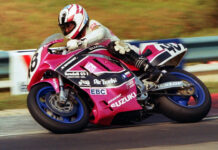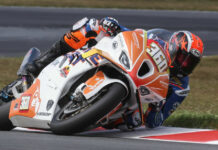HARLEY-DAVIDSON DELIVERS CONTINUED GROWTH FOR FOURTH QUARTER and FULL YEAR
Full-Year EPS Rises 20.6% on 5.7% Revenue Growth
New Harley-Davidson Motorcycle Retail Sales Grow 5.7% Worldwide in Fourth Quarter and 4.4% for Full Year
Fourth-quarter diluted earnings per share increased 9.7% to $0.34, primarily on strong operating results in the Motorcycles segment, including higher revenue and lower operating expense, compared to the year-ago period. Fourth-quarter net income was $75.4 million on consolidated revenue of $1.19 billion, compared to net income of $70.6 million on consolidated revenue of $1.17 billion in the year-ago period.
Worldwide retail sales of new Harley-Davidson motorcycles grew 5.7% in the quarter and 4.4% for the full year, compared to the year-ago periods.
For the full year 2013, Harley-Davidson net income was $734.0 million on consolidated revenue of $5.90 billion, compared to full-year 2012 net income of $623.9 million on consolidated revenue of $5.58 billion. Full-year 2013 diluted earnings per share were $3.28, up 20.6% from EPS of $2.72 in 2012.
“Without question 2013 was an outstanding year for Harley-Davidson. We unveiled game-changing motorcycles like Project Rushmore and Street, launched surge manufacturing, celebrated our 110th anniversary with customers around the globe and delivered continued financial growth,” said Keith Wandell, Chairman, President and Chief Executive Officer of Harley-Davidson, Inc.
“Harley-Davidson has been relentless at driving improvements throughout the organization that enable us to design, build and deliver motorcycles with unprecedented speed, efficiency, safety and quality. Together with our dealers, we continue to broaden our customer base and inspire riders to experience our brand. In 2013, retail sales of new Harley-Davidson motorcycles to outreach customers in the
“None of these results would be possible without the great efforts of our employees, dealers and suppliers, working as one team and moving in one direction to fulfill customers’ dreams,” said Wandell. “Moving forward, we believe we are well positioned to leverage our momentum, expand our reach among new and existing customers, and further strengthen Harley-Davidson’s position as one of the world’s leading brands.”
Retail Harley-Davidson Motorcycle Sales
Dealers worldwide sold 45,875 new Harley-Davidson motorcycles in the fourth quarter of 2013, compared to 43,405 motorcycles in the year-ago quarter. In the
For the full year 2013, dealers sold 260,839 new Harley-Davidson motorcycles worldwide, compared to 249,849 motorcycles in 2012, with retail unit sales up 4.4% in the
Harley-Davidson Motorcycles and Related Products Segment Results
Fourth-Quarter Results: Operating income for the Motorcycles and Related Products segment (the Motorcycles segment) grew 14.3% to $60.7 million in the fourth quarter of 2013, compared to operating income of $53.1 million in the year-ago period. Operating income in the quarter benefited from higher revenue and lower operating expense compared to the prior-year period.
Revenue from sales of motorcycles to dealers and distributors grew 1.4% to $781.8 million, compared to revenue of $771.1 million in the year-ago period. The Company shipped 46,618 motorcycles worldwide during the quarter, compared to shipments of 47,067 motorcycles in the year-ago period.
Revenue from motorcycle parts and accessories was $169.3 million during the quarter, up 4.8% compared to the year-ago period, and revenue from general merchandise, which includes MotorClothes® apparel and accessories, was $75.9 million, up 2.5% compared to the year-ago period.
Gross margin for the Motorcycles segment was 31.5% in the fourth quarter of 2013, compared to 31.8% in the fourth quarter of 2012. Fourth-quarter operating margin for the Motorcycles segment was 5.9%, compared to operating margin of 5.3% in last year’s fourth quarter.
Twelve-Month Results: For the full year 2013, the Company shipped 260,471 motorcycles to dealers and distributors, a 5.2% increase compared to 2012. Full-year revenue from motorcycles grew 8.0% to $4.07 billion, revenue from parts and accessories grew 1.5% to $873.1 million and revenue from general merchandise decreased 1.2% to $295.9 million, compared to 2012. Full-year gross margin for the Motorcycles segment was 35.4% and operating margin was 16.6%, compared to 34.8% and 14.5% respectively in 2012.
Financial Services Segment Results
Operating income from financial services was $61.3 million in the fourth quarter of 2013, compared to $63.0 million in last year’s fourth quarter. Full-year 2013 operating income from financial services was $283.1 million, compared to $284.7 million in 2012. Results for the fourth quarter and full year reflect an increased provision for credit losses, partially offset by favorable net interest income.
Guidance
Harley-Davidson expects to ship 279,000 to 284,000 motorcycles to dealers and distributors worldwide in 2014, an approximate 7% to 9% increase from 2013 shipments. In the first quarter of 2014, the Company expects to ship 76,500 to 81,500 motorcycles, compared to 75,222 motorcycles shipped in the year-ago period. The Company expects full-year 2014 operating margin of 17.5% to 18.5% for the Motorcycles segment. The Company expects 2014 capital expenditures for Harley-Davidson, Inc. of $215 million to $235 million.
Restructuring
Harley-Davidson realized a restructuring benefit of $0.4 million in the fourth quarter of 2013, and a restructuring benefit for the full year of $2.1 million. With the completion of restructuring activities in 2013, Harley-Davidson incurred total restructuring costs of $479 million in the Motorcycles segment since the inception of restructuring in 2009. The Company realized savings of $310 million in 2013 from restructuring. The Company continues to expect the now-completed restructuring activities to result in annual savings of approximately $320 million beginning in 2014.
Income Tax Rate
For the full year 2013, Harley-Davidson’s effective tax rate was 34.1%, compared to 35.1% in 2012. The lower effective tax rate was primarily driven by the retroactive reinstatement of the Research and Development Tax Credit. The Company expects its full-year 2014 effective tax rate will be approximately 35.5%.
Cash Flow
Cash and marketable securities totaled $1.17 billion at year-end 2013, compared to $1.20 billion at year-end 2012. In 2013, Harley-Davidson generated $977.1 million of cash from operating activities, compared to $801.5 million in 2012. On a discretionary basis, the Company repurchased 2.7 million shares of Harley-Davidson, Inc. common stock during the fourth quarter of 2013 at a cost of $176.3 million. For the full year 2013, Harley-Davidson repurchased 7.7 million shares of its common stock at a cost of $455.6 million. In the fourth quarter of 2013, there were approximately 222.2 million Harley-Davidson weighted-average diluted common shares outstanding. At the end of 2013, 8.6 million shares remained on board-approved share repurchase authorizations.
Company Background
Harley-Davidson, Inc. is the parent company of Harley-Davidson Motor Company and Harley-Davidson Financial Services. Harley-Davidson Motor Company produces custom, cruiser and touring motorcycles and offers a complete line of Harley-Davidson motorcycle parts, accessories, riding gear and apparel, and general merchandise. Harley-Davidson Financial Services provides wholesale and retail financing, insurance, extended service and other protection plans and credit card programs to Harley-Davidson dealers and riders in the
Conference Call and Webcast Presentation
Harley-Davidson will discuss fourth-quarter results on a Webcast at 8:00 a.m. CT today. The Webcast presentation will be posted prior to the call and can be accessed at http://investor.harley-davidson.com/. Click “Events and Presentations” under “Resources.” The audio portion of today’s call will also be posted at harley-davidson.com beginning approximately two hours after the conclusion of the call for one year. The audio may also be accessed until Feb. 13, 2014 by calling 404-537-3406 or 855-859-2056 in the
Forward-Looking Statements
The Company intends that certain matters discussed in this release are “forward-looking statements” intended to qualify for the safe harbor from liability established by the Private Securities Litigation Reform Act of 1995. These forward-looking statements can generally be identified as such because the context of the statement will include words such as the Company “believes,” “anticipates,” “expects,” “plans,” or “estimates” or words of similar meaning. Similarly, statements that describe future plans, objectives, outlooks, targets, guidance or goals are also forward-looking statements. Such forward-looking statements are subject to certain risks and uncertainties that could cause actual results to differ materially from those anticipated as of the date of this release. Certain of such risks and uncertainties are described below. Shareholders, potential investors, and other readers are urged to consider these factors in evaluating the forward-looking statements and cautioned not to place undue reliance on such forward-looking statements. The forward-looking statements included in this release are only made as of the date of this release, and the Company disclaims any obligation to publicly update such forward-looking statements to reflect subsequent events or circumstances.
The Company’s ability to meet the targets and expectations noted depends upon, among other factors, the Company’s ability to (i) execute its business strategy, (ii) adjust to fluctuations in foreign currency exchange rates, interest rates and commodity prices, (iii) manage through inconsistent economic conditions, including changing capital, credit and retail markets, (iv) manage through the effects inconsistent and unpredictable weather patterns may have on retail sales of motorcycles, (v) implement and manage enterprise-wide information technology solutions, including solutions at its manufacturing facilities, and secure data contained in those systems, (vi) anticipate the level of consumer confidence in the economy, (vii) continue to realize production efficiencies at its production facilities and manage operating costs including materials, labor and overhead, (viii) manage production capacity and production changes, (ix) manage changes and prepare for requirements in legislative and regulatory environments for its products, services and operations, (x) provide products, services and experiences that are successful in the marketplace, (xi) manage risks that arise through expanding international manufacturing, operations and sales, (xii) manage the credit quality, the loan servicing and collection activities, and the recovery rates of HDFS’ loan portfolio, (xiii) continue to manage the relationships and agreements that it has with its labor unions to help drive long-term competitiveness, (xiv) manage supply chain issues, including any unexpected interruptions or price increases caused by raw material shortages or natural disasters, (xv) develop and implement sales and marketing plans that retain existing retail customers and attract new retail customers in an increasingly competitive marketplace, (xvi) adjust to healthcare inflation and reform, pension reform and tax changes, (xvii) retain and attract talented employees, (xviii) manage the risks that our independent dealers may have difficulty obtaining capital and managing through changing economic conditions and consumer demand, (xix) continue to have access to reliable sources of capital funding and adjust to fluctuations in the cost of capital, (xx) continue to develop the capabilities of its distributor and dealer network, and (xxi) detect any issues with our motorcycles or manufacturing processes to avoid delays in new model launches, recall campaigns, increased warranty costs or litigation.
In addition, the Company could experience delays or disruptions in its operations as a result of work stoppages, strikes, natural causes, terrorism or other factors. Other factors are described in risk factors that the Company has disclosed in documents previously filed with the Securities and Exchange Commission.
The Company’s ability to sell its motorcycles and related products and services and to meet its financial expectations also depends on the ability of the Company’s independent dealers to sell its motorcycles and related products and services to retail customers. The Company depends on the capability and financial capacity of its independent dealers and distributors to develop and implement effective retail sales plans to create demand for the motorcycles and related products and services they purchase from the Company. In addition, the Company’s independent dealers and distributors may experience difficulties in operating their businesses and selling Harley-Davidson motorcycles and related products and services as a result of weather, economic conditions or other factors.






